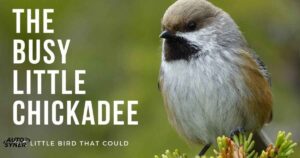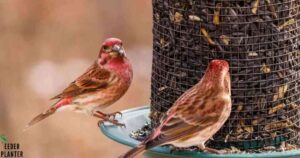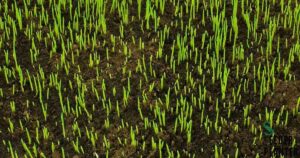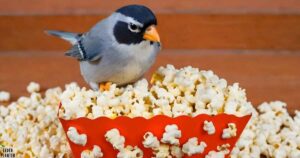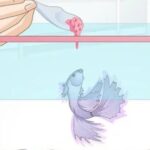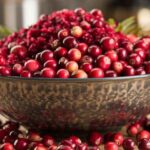As a bird enthusiast, you may have wondered, “Can birds eat chia seeds?” It’s a common concern, especially when trying to provide the best nutrition for our feathered friends. Many bird lovers struggle to find the right balance of nutrients in their birds’ diets, often relying on traditional bird seed mixes that may lack essential nutrients.
This problem can lead to undernourished birds with dull plumage and lowered immunity. But there’s a solution: chia seeds for birds. These tiny powerhouses of nutrition could be the answer to enhancing your birds’ diet. In this comprehensive guide, we’ll explore how chia seeds can benefit birds and the best ways to incorporate them into their meals.
Can Birds Eat Chia Seeds: The Definitive Answer
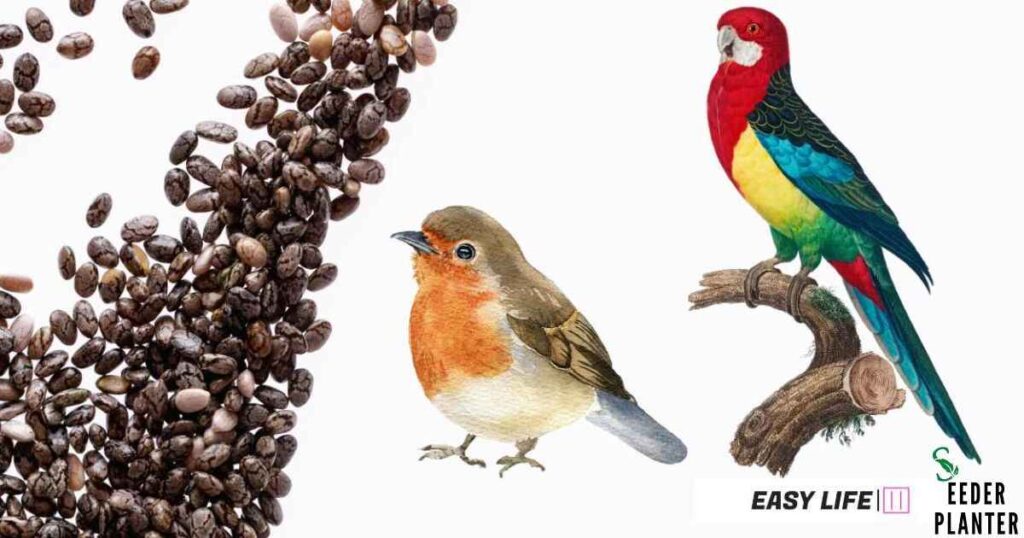
The short answer is yes, birds can eat chia seeds. In fact, these tiny seeds can be a fantastic addition to a healthy bird diet. Chia seeds are packed with nutrients that can support various aspects of avian health, from feather growth to immune function.
While chia seeds are safe for birds, it’s essential to introduce them properly. As with any new food, moderation is key. Start by offering small amounts mixed with their regular feed. This approach allows birds to adjust to the new food and prevents any potential digestive issues.
Safety Considerations
When feeding birds chia seeds, there are a few safety considerations to keep in mind. First, always ensure the seeds are fresh and free from mold or contaminants. Opt for organic bird food when possible to avoid exposure to pesticides.
It’s also important to provide chia seeds in a form that’s easy for birds to consume. While some birds can eat dry chia seeds, others may prefer them soaked. Soaking chia seeds creates a gel-like consistency that can be easier for some birds to eat and digest.
Nutritional Benefits of Chia Seeds to Birds
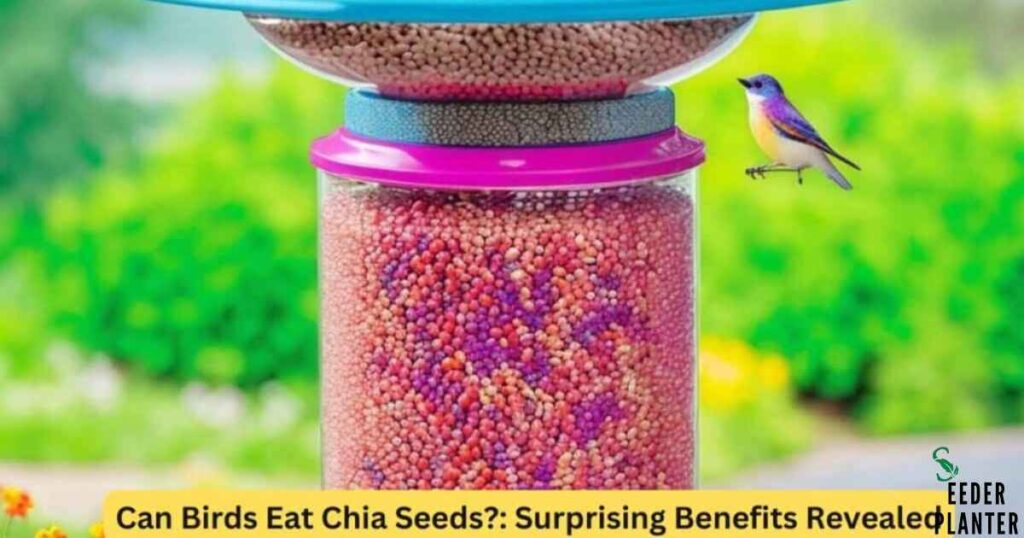
Chia seeds offer a wealth of nutritional benefits for birds. These tiny seeds are packed with essential nutrients that can support various aspects of avian health. From promoting healthy feathers to boosting immune function, chia seeds can be a valuable addition to a bird’s diet.
Let’s break down the key nutrients found in chia seeds and how they benefit our feathered friends. Understanding these benefits can help bird owners make informed decisions about incorporating chia seeds into their birds’ diets.
Protein and Amino Acids
Protein for bird feathers is crucial, and chia seeds deliver on this front. They contain all nine essential amino acids, making them a complete protein source. This is particularly important for feather growth and maintenance.
Birds require a constant supply of protein to replace worn-out feathers and grow new ones during molting seasons. The high-quality protein in chia seeds can support this process, helping birds maintain healthy, vibrant plumage.
Omega-3 Fatty Acids
One of the standout features of chia seeds is their high content of omega-3 fatty acids for birds. These essential fats play a vital role in bird health, supporting heart function, brain development, and reducing inflammation.
Omega-3s are particularly beneficial for nesting female birds nutrition, as these fatty acids are crucial for egg development. They can also help improve the overall health and vitality of all birds, making chia seeds a valuable dietary supplement.
Fiber Content
Chia seeds are an excellent source of dietary fiber, which is essential for bird digestion. The high fiber content can help promote healthy gut function and regular bowel movements in birds.
Fiber also helps birds feel full and satisfied, which can be particularly beneficial for overweight birds or those prone to overeating. The gel-like consistency of soaked chia seeds can also help soothe the digestive tract.
Vitamins and Minerals
Chia seeds are rich in various vitamins and minerals that support overall bird health. They contain significant amounts of calcium for birds, which is crucial for bone health and egg production in laying hens.
These seeds are also a good source of phosphorus for birds, another mineral essential for strong bones and proper cellular function. Additionally, chia seeds contain antioxidants, which can help protect birds from cellular damage and support their immune system health.
How to Safely Introduce Chia Seeds into a Bird’s Diet
Introducing chia seeds to your birds’ diet should be done gradually. Start by mixing a small amount of chia seeds with their regular feed. This allows birds to get accustomed to the new food without causing digestive upset.
Over time, you can increase the proportion of chia seeds in their diet. However, chia seeds should not make up more than 10-15% of a bird’s total diet. Always observe your birds for any signs of discomfort or changes in behavior when introducing new foods.
Proper Preparation Methods
There are several ways to prepare chia seeds for birds. You can offer them dry, mixed with other seeds, or soak them in water before feeding. Soaking chia seeds creates a gel-like consistency that some birds find appealing.
To soak chia seeds, mix one part seeds with three parts water and let sit for about 15 minutes. This creates a pudding-like texture that can be easily mixed with other foods or offered on its own.
Mixing with Other Foods
Chia seeds can be easily incorporated into various bird food mixtures. Try mixing them with other bird feeder seeds or adding them to homemade bird food recipes. You can also sprinkle them over fresh fruits or vegetables for an added nutritional boost.
Remember to maintain a balanced diet. While chia seeds are nutritious, they should complement, not replace, other essential components of a wild bird diet.
How Many Chia Seeds Can a Bird Eat?
The amount of chia seeds a bird can eat depends on its size and species. As a general rule, chia seeds should make up no more than 10-15% of a bird’s total diet. For small birds like finches or canaries, this might mean just a pinch of seeds per day.
Larger birds like parrots or pigeons can consume more, but moderation is still key. Always monitor your bird’s reaction to new foods and adjust portions as needed.
Overfeeding Risks
While chia seeds are nutritious, overfeeding can lead to problems. Too many chia seeds can cause digestive issues or nutritional imbalances. Signs of overfeeding may include changes in droppings, decreased appetite, or weight gain.
If you notice any of these signs, reduce the amount of chia seeds in your bird’s diet and consult with an avian veterinarian if problems persist.
Best Time to Feed Chia Seeds to Wild Birds
The best time to feed chia seeds to wild birds can vary depending on the season and the birds’ nutritional needs. In general, chia seeds can be offered year-round as part of a balanced diet for backyard birds.
During breeding season, typically spring and early summer, chia seeds can be particularly beneficial. Their high nutrient content can support nesting birds and growing chicks. However, chia seeds can provide valuable nutrition in any season.
Read This Blog: Planting a Seed of Faith: Bible Verses and Spiritual Growth
Do Birds Eat Chia Seeds in the Winter?
Yes, birds can and do eat chia seeds in winter. In fact, chia seeds can be an excellent addition to winter bird food. The high fat content in chia seeds can help birds maintain their body temperature during cold months.
Winter is a challenging time for wild birds, and high-energy foods like chia seeds can provide much-needed sustenance. Consider mixing chia seeds with other high-fat foods like suet or peanut butter for a nutritious winter treat.
Do Birds Eat Chia Seeds in the Summer?
Birds can also benefit from chia seeds in summer. As summer bird food, chia seeds can provide energy for active birds during breeding and nesting seasons. The omega-3 fatty acids in chia seeds can be particularly beneficial for egg-laying females.
In hot weather, you can offer soaked chia seeds, which can help keep birds hydrated. Mix soaked chia seeds with fresh fruits for a refreshing summer snack for your backyard birds.
Common Bird Species That Eat Chia Seeds
Many seed-eating birds readily accept chia seeds as part of their diet. These include finches, sparrows, chickadees, and many types of parrots. Even some primarily insectivorous birds may enjoy chia seeds as an occasional treat.
It’s important to note that while many birds can eat chia seeds, individual preferences may vary. Some birds may take to chia seeds immediately, while others may need time to adjust.
In the US
In the United States, common backyard birds that may enjoy chia seeds include American Goldfinches, House Finches, and various sparrow species. These birds are naturally inclined to eat small seeds and often visit backyard feeders.
Larger birds like Blue Jays and Cardinals may also consume chia seeds, especially when mixed with other foods. Even woodpeckers, known for their love of suet, may pick at chia seeds if offered.
In the UK
In the United Kingdom, garden birds like Greenfinches, Chaffinches, and Buntings and finches are likely to appreciate chia seeds. These birds are adapted to eating a variety of small seeds and can easily incorporate chia into their diets.
Also Read This Blog : The Complete Guide to Growing and Caring for the Giant Leopard Plant
Robins and Blackbirds, while primarily insectivorous, may also sample chia seeds, especially when mixed with other foods. As always, observe your local birds to see which species show interest in chia seeds.
Chia Seeds vs. Other Bird Foods
While chia seeds offer numerous benefits, they should be considered as part of a diverse diet rather than a replacement for other bird foods. Traditional bird seeds like sunflower seeds, millet, and nyjer still have their place in a balanced bird diet.
Chia seeds stand out for their high omega-3 content and complete protein profile. However, they may not provide all the nutrients birds need. A varied diet that includes a mix of seeds, fruits, and insects (for species that eat them) is ideal for most birds.
Complementing Traditional Bird Diets
Chia seeds can excellently complement traditional bird diets. They can be mixed with other seeds in feeders or added to homemade bird food recipes. For example, you could create a nutritious mix of chia seeds, sunflower seeds, and dried fruits.
When incorporating chia seeds into your birds’ diet, think of them as a supplement rather than a staple. They can enhance the nutritional profile of your birds’ meals without replacing other important food sources.
DIY Chia Seed Bird Feeders
Creating DIY chia seed bird feeders can be a fun and rewarding way to offer these nutritious seeds to your backyard visitors. Here are a few simple ideas:
- Chia Seed Bells: Mix chia seeds with gelatin and mold them into bell shapes. Once dry, hang them from tree branches.
- Chia Seed Suet Cakes: Incorporate chia seeds into homemade suet cakes for a nutritious winter treat.
- Chia Seed Sprinkle: Simply sprinkle chia seeds over existing bird feeders or bird tables.
Remember to clean your feeders regularly to prevent the spread of diseases among birds.
Potential Concerns and Precautions
While chia seeds are generally safe for birds, there are a few precautions to keep in mind. First, always introduce new foods gradually and in small amounts. This allows you to monitor your birds for any adverse reactions.
Ensure that chia seeds don’t make up too large a portion of your birds’ diet. While nutritious, they shouldn’t replace other important food sources. Also, be aware that wet chia seeds can spoil quickly, especially in warm weather. Replace uneaten, soaked seeds daily.
Frequently Asked Question
Can birds eat expired chia seeds?
It’s best to avoid feeding birds expired chia seeds. Fresh seeds provide the most nutritional benefits and reduce the risk of mold or bacterial growth.
Can budgies eat chia seeds?
Yes, budgies can eat chia seeds in moderation. These tiny seeds can provide valuable nutrients for these small parakeets.
Can lovebirds eat chia seeds?
Lovebirds can safely consume chia seeds. These seeds can be a nutritious addition to their diet when offered in appropriate amounts.
Can parakeets eat chia seeds?
Parakeets can eat chia seeds. These nutrient-dense seeds can be a healthy supplement to a parakeet’s regular diet.
Can pigeons eating chia seeds be beneficial?
Pigeons can eat and benefit from chia seeds. The high nutrient content can support their overall health and vitality.
Conclusion
The answer to “Can birds eat chia seeds?” is a resounding yes. These tiny seeds pack a powerful nutritional punch that can benefit a wide variety of bird species. From supporting feather health to boosting immune function, chia seeds offer numerous advantages for our feathered friends.
However, as with any aspect of bird care, moderation and balance are key. Chia seeds should be part of a varied diet that meets all of a bird’s nutritional needs. By thoughtfully incorporating chia seeds into your birds’ meals, you can help support their health and vitality.
Remember to introduce chia seeds gradually, observe your birds for any changes, and always prioritize a diverse, species-appropriate diet. With these guidelines in mind, chia seeds can be a valuable addition to your backyard bird feeding routine, supporting the health and happiness of your avian visitors.

I am Alexander James, a seasoned professional with 4 years of expertise, brings passion and skill to every project. Elevate your experience with my knowledge and creativity.
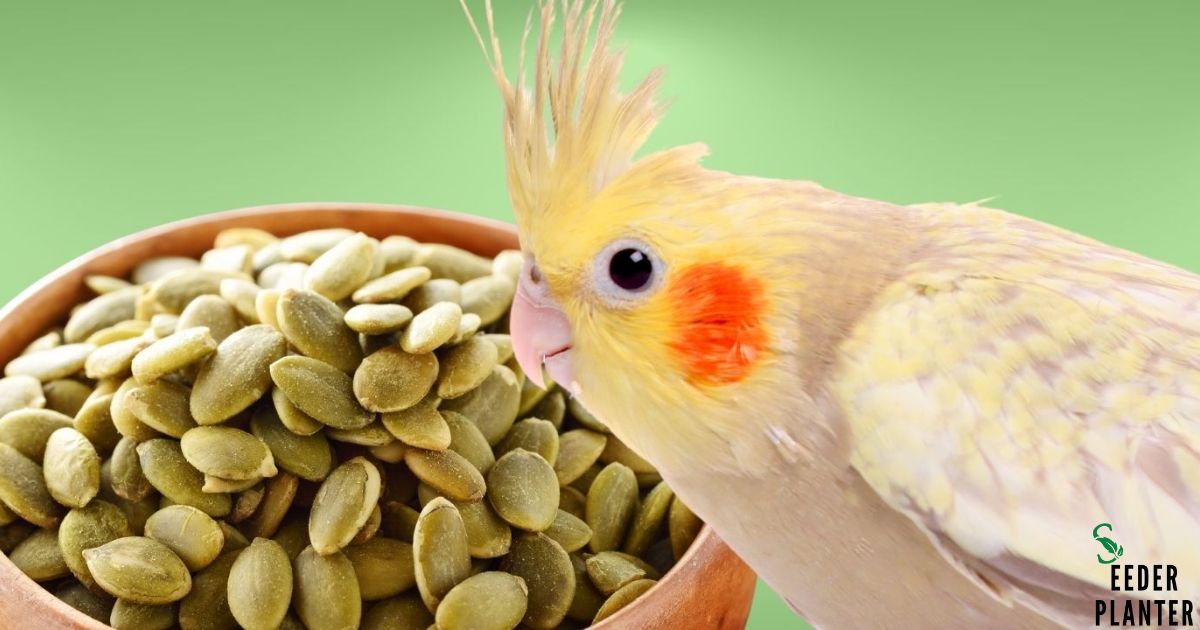

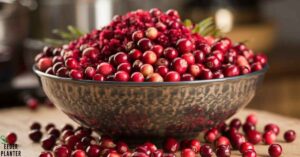
![Hollyhock Seeds: The Complete Guide to Success [2024]](https://seederabout.com/wp-content/uploads/2024/10/Hollyhock-Seeds-The-Complete-Guide-to-Success-2024-300x157.jpg)
